高中英语外研版选修七 Module 3 Literature Period One Introduction & Reading and Vocabulary课件(共70 张PPT)
文档属性
| 名称 | 高中英语外研版选修七 Module 3 Literature Period One Introduction & Reading and Vocabulary课件(共70 张PPT) | 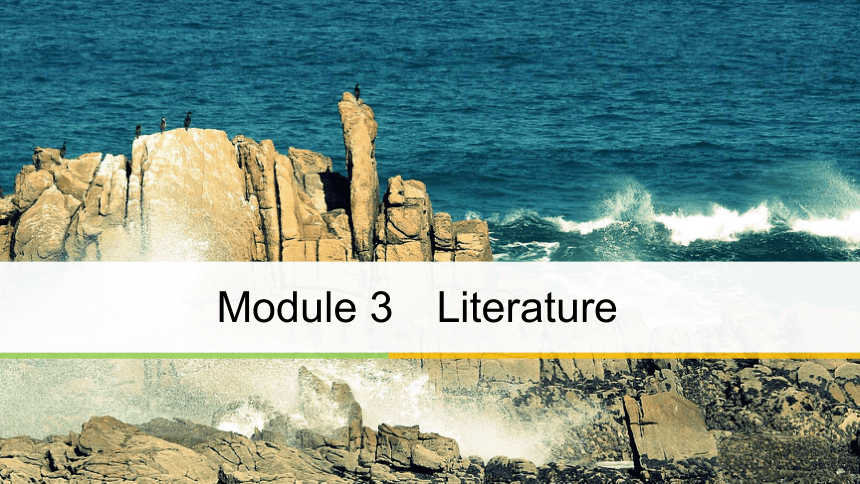 | |
| 格式 | zip | ||
| 文件大小 | 1.5MB | ||
| 资源类型 | 教案 | ||
| 版本资源 | 外研版 | ||
| 科目 | 英语 | ||
| 更新时间 | 2019-03-12 17:05:34 | ||
图片预览

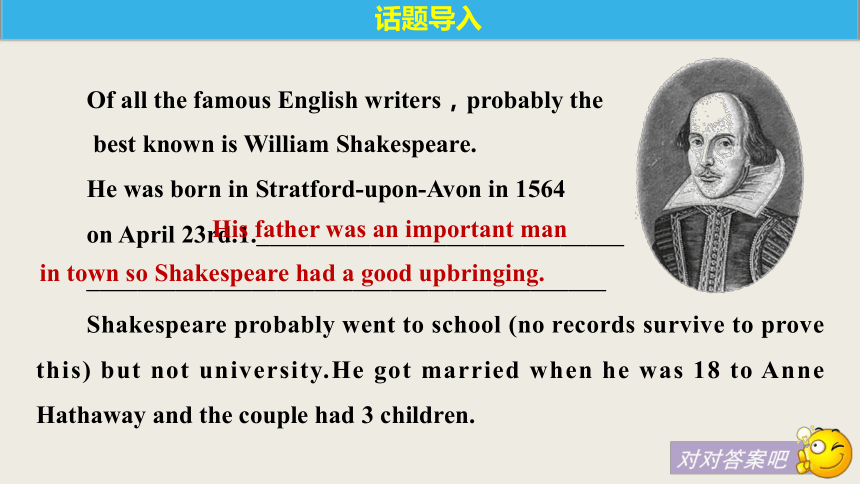
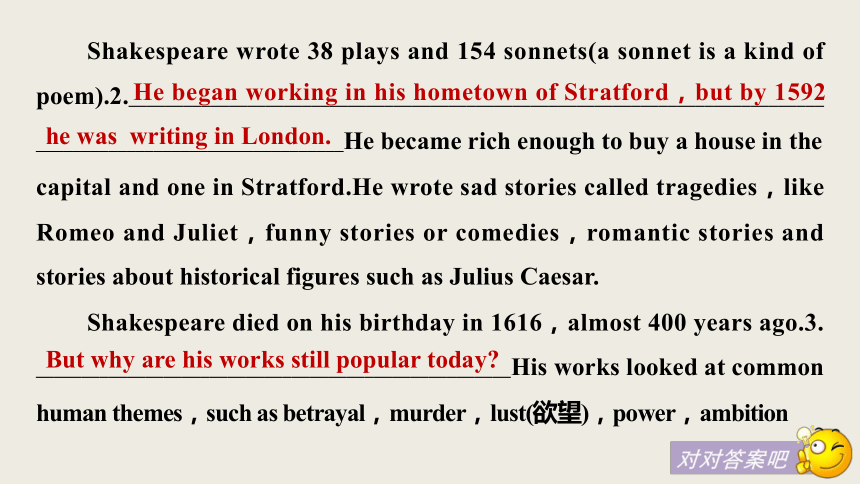
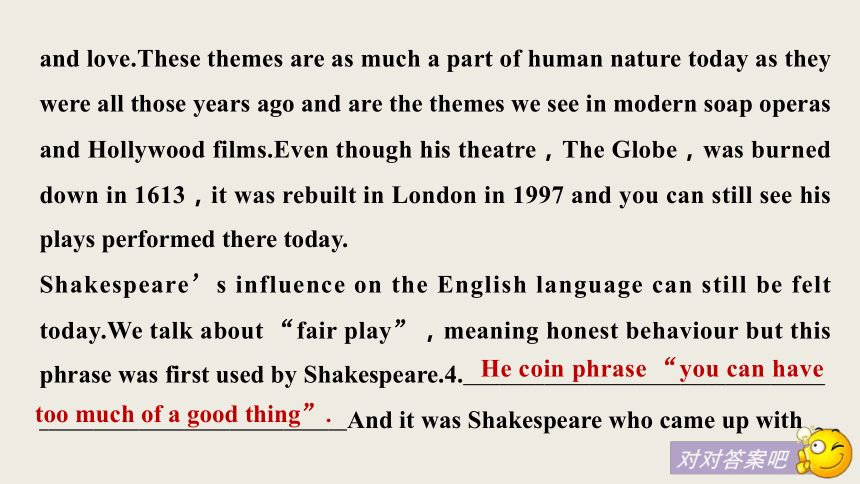

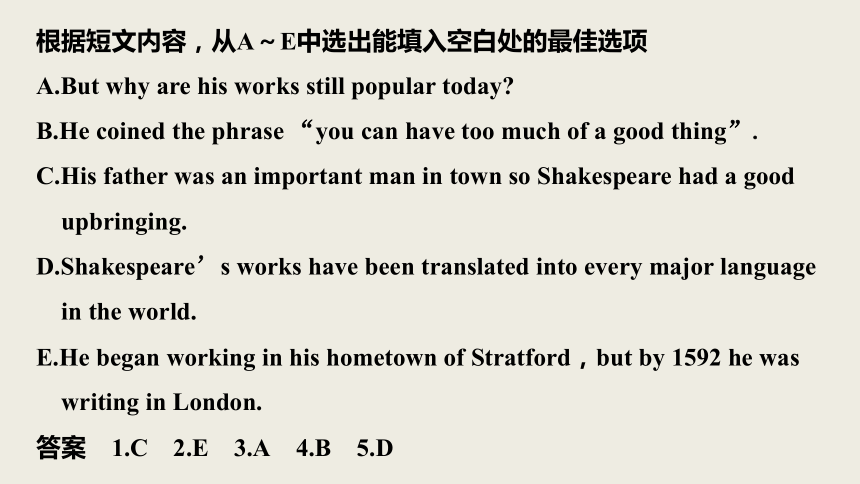
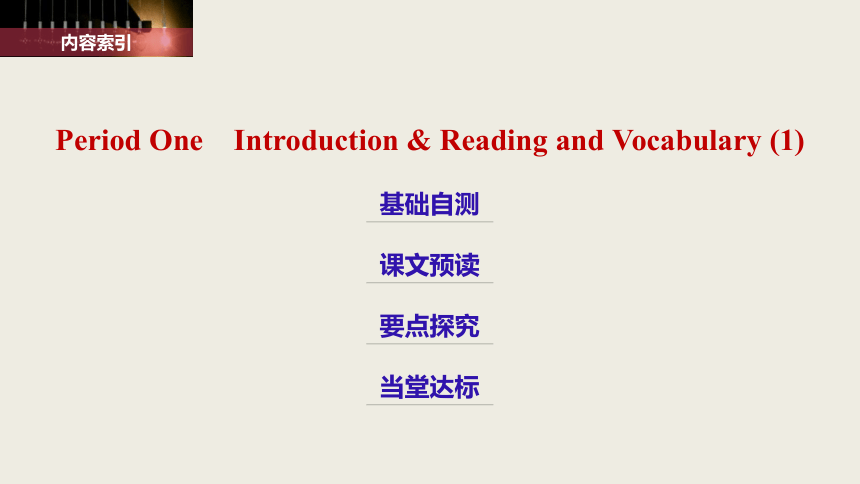

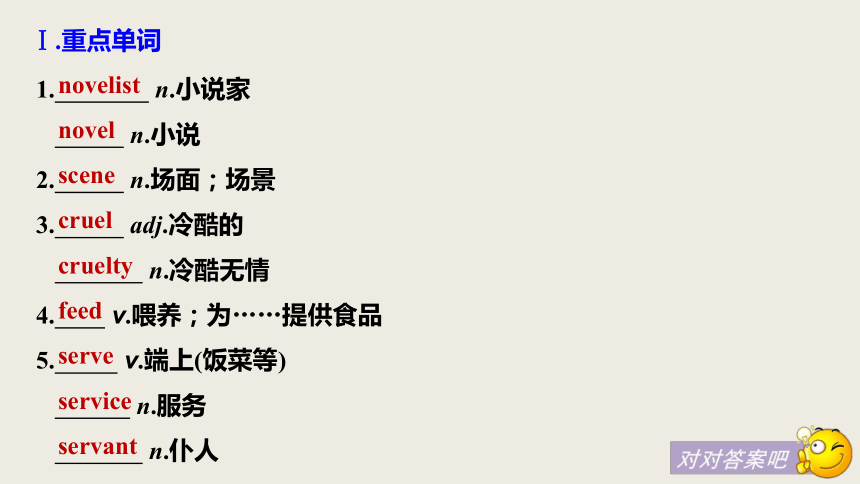
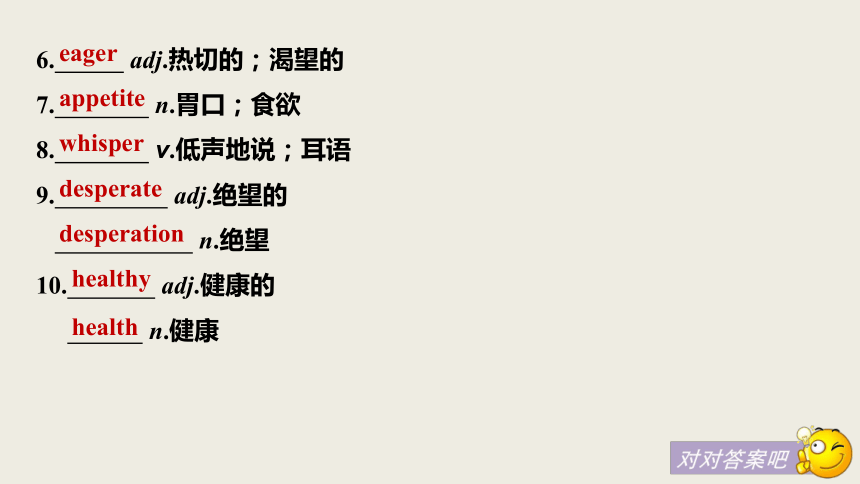
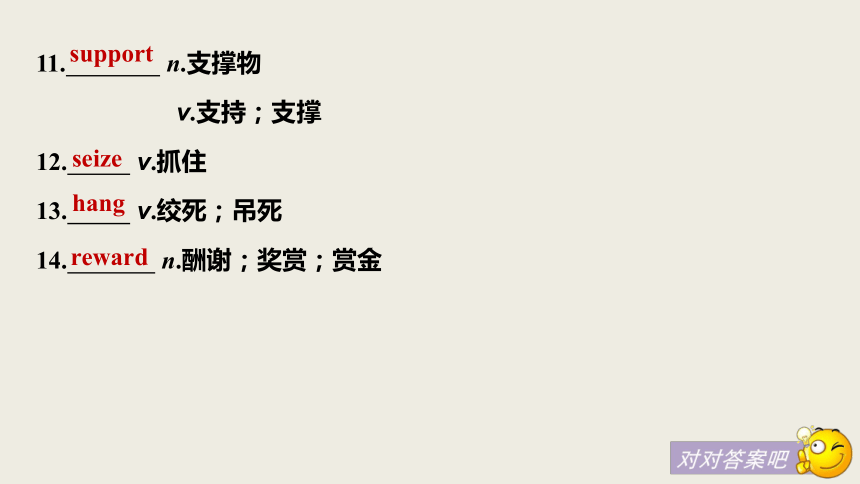
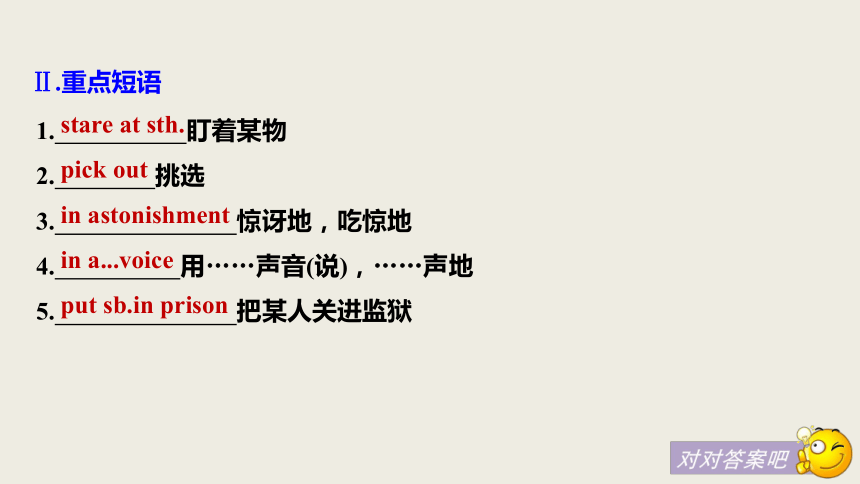
文档简介
课件70张PPT。Module 3 LiteratureOf all the famous English writers,probably the
best known is William Shakespeare.
He was born in Stratford-upon-Avon in 1564
on April 23rd.1._____________________________
_________________________________________
Shakespeare probably went to school (no records survive to prove this) but not university.He got married when he was 18 to Anne Hathaway and the couple had 3 children.话题导入 His father was an important manin town so Shakespeare had a good upbringing.Shakespeare wrote 38 plays and 154 sonnets(a sonnet is a kind of poem).2.______________________________________________________________________________________________________________He became rich enough to buy a house in the capital and one in Stratford.He wrote sad stories called tragedies,like Romeo and Juliet,funny stories or comedies,romantic stories and stories about historical figures such as Julius Caesar.
Shakespeare died on his birthday in 1616,almost 400 years ago.3. ____________________________________________________His works looked at common human themes,such as betrayal,murder,lust(欲望),power,ambition He began working in his hometown of Stratford,but by 1592 he was writing in London.But why are his works still popular today?and love.These themes are as much a part of human nature today as they were all those years ago and are the themes we see in modern soap operas and Hollywood films.Even though his theatre,The Globe,was burned down in 1613,it was rebuilt in London in 1997 and you can still see his plays performed there today.
Shakespeare’s influence on the English language can still be felt today.We talk about “fair play”,meaning honest behaviour but this phrase was first used by Shakespeare.4.________________________________________ __________________________________And it was Shakespeare who came up with He coin phrase “you can have too much of a good thing”.the expression to disappear “into thin air”which we still use today when we lose something.
5.____________________________________________________________________________________________________________ And perhaps we’ll still be as fascinated by his works 400 years from now as we’ve been for almost the last 400. Shakespeare’s works have been translated into every major language in the world.根据短文内容,从A~E中选出能填入空白处的最佳选项
A.But why are his works still popular today?
B.He coined the phrase “you can have too much of a good thing”.
C.His father was an important man in town so Shakespeare had a good
upbringing.
D.Shakespeare’s works have been translated into every major language
in the world.
E.He began working in his hometown of Stratford,but by 1592 he was
writing in London.
答案 1.C 2.E 3.A 4.B 5.D基础自测 课文预读内容索引要点探究当堂达标Period One Introduction & Reading and Vocabulary (1)基础自测1. n.小说家
n.小说
2. n.场面;场景
3. adj.冷酷的
n.冷酷无情
4. v.喂养;为……提供食品
5. v.端上(饭菜等)
n.服务
n.仆人Ⅰ.重点单词novelist
novel
scene
cruel
cruelty
feed
serve
service
servant6. adj.热切的;渴望的
7. n.胃口;食欲
8. v.低声地说;耳语
9. adj.绝望的
n.绝望
10. adj.健康的
n.健康eager
appetite
whisper
desperate
desperation
healthy
health11. n.支撑物
v.支持;支撑
12. v.抓住
13. v.绞死;吊死
14. n.酬谢;奖赏;赏金supportseize
hangrewardⅡ.重点短语1. 盯着某物
2. 挑选
3. 惊讶地,吃惊地
4. 用……声音(说),……声地
5. 把某人关进监狱stare at sth.
pick out
in astonishment
in a...voice
put sb.in prisonⅢ.重点句式Not until at least thirty seconds had passed, the man able to speak.
至少过了三十秒钟,他才说出话来。1.not until位于句首时,句子用部分倒装wasNo sooner had the boy spoken these words the warden hit him on the head with the soup spoon.
孩子的话刚出口,大师傅就操起汤勺狠狠地敲他的脑袋。2.no sooner ...than ...than heard anything like it!
我还从来没听过这样的事呢!3.否定副词位于句首,主句要部分倒装Never have I课文预读Ⅰ.阅读课文,匹配各部分大意
1.Part 1 (Para.1) A.Oliver was chosen to ask for more food.
2.Part 2 (Paras.2—3) B.All the boys in the workhouse were hungry.
3.Part 3 (Paras.4—13) C.Oliver was hit and locked.Ⅱ.课文阅读理解
1.This passage is mainly about .
A.Oliver’s happy life
B.Oliver and his companions’ satisfying life
C.Oliver and his companions’ terrible life
D.Oliver’s study experience√答案123452.Who served the soup from the pot at meal times?
A.Only the warden.
B.A man who kept a small cook shop.
C.The warden and two other women.
D.A gentleman in white jacket.12345√答案3.The boys there never washed their bowls because .
A.they cleared their bowls with their spoons in order to eat every bit of soup
B.they were so lazy that they didn’t want to do it
C.there was not any water in the large stone hall
D.their parents would help them wash the bowls12345√答案4.Why did the boys there have a meeting before supper?
A.Because all of them were not used to being hungry all the time.
B.Because all the boys had excellent appetites.
C.Because all the boys wanted to use smaller spoons.
D.Because they wanted to choose one boy to ask the warden for more food.12345√答案5.When Oliver asked for more food,the warden’s face became very pale because he was .
A.frightened by Oliver’s words
B.astonished at Oliver’s words
C.very angry about Oliver’s words
D.badly ill12345√答案要点探究
The photo shows a famous scene from the film of Oliver Twist,one of his most popular novels.
这张照片是电影《雾都孤儿》中著名的一幕,《雾都孤儿》是他最受欢迎的小说之一。重点词汇scene n.场景;场面
on the scene在场,出现,登场
at the scene of在……现场
behind the scene在幕后;秘密地;在后台
come on the scene登场;出现在舞台上归纳拓展(1)The scene in the hospital was very moving.
在医院的那一场面十分感人。
(2)The police were soon on the scene.
警察很快赶到现场。
(3)This great leader came on the scene just when his country needed him.
这位伟大的领袖就在国家需要他的时候上台了。语境助记scene,scenery,view,sight
(1)scene指局部的、一眼可见全貌的风景或景色,不限于自然的风景,此种情况下是可数名词。作“布景”讲时,指的是舞台的部分场景。
(2)scenery指某一国家或地区整体的自然风景,是不可数名词。
(3)view常指从某一特定地点看到的景色、风景。
(4)sight指某一地区值得观赏的具有特色的人文景观、风景、名胜等。易混辨析(1)用scene,scenery,view,sight的正确形式填空
①We passed through some beautiful on our journey through the Lake District.
②The Great Wall is one of the most breathtaking in the world.
③You’ll get a fine of the town from the top of the hill.
④What a beautiful the opening ceremony of the Shanghai World Expo took on!题组训练scenerysightsviewscene(2)用适当的介词填空
①People gathered the scene of the accident.
②Journalists were the scene within minutes.
③Enemies the scene are more dangerous than those on the stage.atonbehindfeed v.喂养;为……提供食品
feed sb.with/on sth.用某物喂养某人
feed sth.to sb.把某物给某人吃
feed on(=live on)(人)以……为食
be fed up with(=be tired of)(口语)厌倦……
The room in which the boys were fed was a large stone hall,with a large pot at one end.
孩子们就餐的地方是一间宽敞的大石厅,一口大锅放在大厅的一侧。归纳拓展(1)The mother is feeding her baby with porridge.
母亲正在给她的宝宝喂粥。
(2)Please feed the rice to the chicken.
请用这些米喂小鸡。
(3)All animals including man feed on plants or other animals.
包括人类在内的所有动物都以植物或其他动物为食。
(4)I am fed up with this dank weather;it’s time we had some sunshine.
我对这种阴湿天气极其厌倦,该出太阳了。语境助记(1)单句语法填空
①The young mother sat in the sofa, (feed) milk to her baby.
②This kind of animals feed little mammals.
(2)句型转换
①The boy feeds his little sister with milk.
The boy his his little sister.
②I am tired of the job and want to change another one.
the job,I want to change another one.题组训练feedingonfeeds milk toFed up with(1)serve v.端上(饭菜等);服务
serve sb.(with) sth./serve sth.to sb.用某物招待某人
serve as担任;起……作用
serve in the army参军,服兵役
(2)service n.接待,服务
at the service of sb./at one’s service随时为某人服务
The warden,helped by two women,served the soup from this pot at meal times.
开饭的时候,大师傅在锅边舀粥,有两个女人给他打下手。归纳拓展(1)The waiter served him a glass of beer.
服务员给他端上了一杯啤酒。
(2)This served as a reminder that we must never forget the past.
这可以提醒我们绝不要忘记过去。
(3)We are at your service at all times.
我们随时为您效劳。语境助记(1)单句语法填空
①Breakfast (serve) between 7 and 9 a.m.
②The students served the invited experts some apples.
③Were the tourists satisfied with the (serve) at your hotel?
(2)完成句子
①有时候他在餐厅当服务员。
Sometimes he a waiter at the restaurant.
②如果你需要建议,我随时可以帮你忙。
If you need advice,I .题组训练is servedservicewithserves asam at your service
When they had cleaned their bowls in this way,they would sit staring at the pot with eager eyes,as if they wanted to eat it.
他们这样把碗刮干净后,就坐在那儿,眼巴巴地瞅着汤锅,似乎要把它吞进肚子里。eager adj.热切的;渴望的
be eager for sth.渴望某事
be eager to do sth.渴望做某事
be eager that...渴望……(从句常用虚拟语气,即从句谓语动词用“should+do”,should可省略)归纳拓展(1)I am eager for success.
我渴望成功。
(2)The children are eager to go to the Great Wall.
孩子们渴望去长城。语境助记eager,anxious
(1)eager意为“渴望的,热衷的”,强调一种积极向上的心态。
(2)anxious意为“焦急的,忧虑的”,侧重“忧虑”,强调一种焦急不安的心态。易混辨析(1)用eager,anxious填空
①The saleswoman in the shop is always to please everybody.
②I am that he’ll do silly things.
(2)句型转换
Rural towns want very much to get any business they can attract.
Rural towns any business they can attract.题组训练are eager foreageranxious(3)完成句子
①She is eager that her daughter (早点到).
②He is (渴望见到) all my friends.(should) arrive earliereager to see
He stared in complete astonishment at the child and held on to the pot for support.
他瞪着那个孩子,完全惊呆了,手抓着锅以求站稳。(1)in astonishment吃惊地,惊讶地
astonishment n.惊讶
to one’s astonishment令某人吃惊的是
(2)astonish v.使惊讶
(3)astonishing adj.令人惊讶的
(4)astonished adj.惊愕的
be astonished at/by被……惊吓,对……吃惊归纳拓展(1)He looked at me in astonishment.
他惊讶地望着我。
(2)To my astonishment,it had completely disappeared.
令我惊讶的是,它已消失得无影无踪了。
(3)What astonishes me most is that the three-year-old boy should know so much about dinosaurs.
最令我吃惊的是这个三岁的孩子竟然知道这么多关于恐龙的知识。
(4)We are astonished at his behaviour.
我们对他的行为感到很吃惊。语境助记(1)用astonish的正确形式填空
What us most was that he was not at all at the
news.
(2)完成句子
①I stood up (吃惊地).
② (令他吃惊的是),he should meet so big a snake.题组训练in astonishmentastonishedTo his astonishmentastonishedastonishing(3)单句改错
I didn’t notice the astonishing look on his face.astonished
“They’ll hang that boy,” said a gentleman in a white jacket.
“他们会把那个孩子吊死,”一个穿着白色夹克的绅士说道。hang v.绞死,吊死;悬挂,垂下
hang on别挂断(常用在打电话时)
hang up悬挂;挂断电话;中止
hang out游荡;闲逛;厮混
注意:hang作不同的意义讲时,其过去式和过去分词不相同。归纳拓展(1)He will be hanged as a spy tomorrow.
明天他将作为间谍被绞死。
(2)The painting hanging in my study is painted by my father.
挂在我书房里的那幅画是我父亲画的。
(3)He hung up before I could speak.
在我说话之前他就挂断了电话。
(4)We hang out together during lunch and after school.
午饭时和放学后我们一起闲逛。语境助记(1)单句语法填空
①Hang a minute—I’m nearly ready.
②There were several expensive suits (hang) in the wardrobe(衣柜).
③He is the last man (hang) for murder in this country.
④I like to hang at mall with my friends.题组训练hangingonto be hangedout(2)单句改错
Go and get your coat hung behind the door.hanging
The next morning a notice was put up on the door of the workhouse,offering a reward to anybody who would employ Oliver Twist.
第二天早晨,孤儿院的大门外贴出了一张告示,向愿意雇佣奥利弗·特威斯特的人提供奖赏。(1)reward n.酬谢;奖赏;赏金;v.奖赏;给以报酬
as a reward (for)作为(对某事的)报酬(或奖赏)
give/offer a reward to sb.for sth.为某事而给某人报酬
in reward for作为对……的酬谢/报答
reward sb.(with...) for sth.为某事(而以……)报答某人
(2)rewarding adj.值得的;有报酬的归纳拓展(1)How can I reward your kindness?
我如何酬谢你的好意呢?
(2)As a reward for passing his exams,he got a new bike from his parents.
作为对他考试及格的奖赏,他父母给他买了辆新自行车。
(3)She got nothing in reward for her kindness.
她的好心没有得到一点回报。
(4)The trainer rewarded the monkey for its good performance.
训练员因猴子的精彩表演而奖励它。语境助记reward,award,prize
(1)reward表示“奖赏,酬谢”,作动词只能以人或人的行为作宾语;作名词表示某人因做了某事而应得到某东西。
(2)award作名词指正式或官方“给予,颁发,授予(奖章、奖金等)”,也可以指法庭裁决;作动词可以跟双宾语,award sb.sth.把某物授予/判给某人。
(3)prize只能作名词,表示“奖赏、奖金、奖品”,尤指在比赛中获得的荣誉。易混辨析(1)用reward,award,prize填空
①He was nominated for the best actor .
②His poem won the first in the contest.
③Winning the match was the for the effort that the team had made.题组训练awardprizereward(2)单句语法填空
①The students have been working hard on their lessons and their efforts
(reward) with success in the end.(2016·北京)
②Everyone who reached the top of Mount Tai was rewarded _______ magnificent view.
③Joe said he found his new job interesting and (reward).
④I gave the boy a dictionary as a reward his selfless help to me.will be rewardedwithrewardingfor
No sooner had the boy spoken these words than the warden hit him on the head with the soup spoon.
孩子的话刚出口,大师傅就操起汤勺狠狠地敲他的脑袋。经典句式no sooner...than...(=hardly/scarcely...when...)一……就……,no sooner,hardly,scarcely放于句首通常使用部分倒装句式。
注意:在此句式中,主句通常使用过去完成时,而从句通常使用一般过去时。归纳拓展(1)He had no sooner finished his speech than the students started cheering.
他一结束演讲,学生们的掌声就响了起来。
(2)No sooner had we left the village than it began to rain.
我们刚离开村子,天就下起雨来了。
(3)Hardly/Scarcely had he finished the article when the light went out.
他刚写完文章,灯就熄灭了。语境助记(1)单句语法填空
①No sooner had Mo Yan stepped on the stage than the audience (break) into thunderous applause.
②Hardly had he arrived in Beijing he came to visit us.
(2)一句多译
他刚进屋,电话铃就响了。
① than the telephone rang.
②He than the telephone rang.题组训练whenbrokeNo sooner had he entered the roomhad no sooner entered the room③ when the telephone rang.
④He when the telephone rang.
(3)单句改错
No sooner had I seen him when I gave the book to him.had hardly/scarcely entered the roomHardly/Scarcely had he entered the roomthan
When they had cleaned their bowls in this way,they would sit staring at the pot with eager eyes,as if they wanted to eat it.难句分析句式分析 本句是一个较复杂的主从复合句,主句是 ;when引导的是 从句;staring at...是现在分词短语作sit的_________
;as if引导 从句,此处as if引导的从句是比喻或夸大了的,要用虚拟语气。自主翻译 ________________________________________________________________________
。 他们这样把碗刮干净后,就坐在那儿,眼巴巴地瞅着汤锅,似乎要把它吞进肚子里they would sit...时间状语伴随方式状语状语当堂达标Ⅰ.单词拼写
1.The prisoners become (绝望的) in their attempts to escape.
2.The (残忍的) man who caused the severe accident was sentenced to death.
3.If you eat a lot of chocolate before supper,it will spoil your (食欲).
4.The parents gave the boy a computer as a (奖赏) for returning their lost bag.
5.There were emotional (场景) as the refugees enjoyed their first breath of freedom.scenesdesperatecruelappetitereward6.At the meeting they to each other in order not to be heard.
7.A diet lacking in nutritional value will not keep a person .
8.Saddam Hussein,the former leader of Iraq,was for crimes against humanity.whisperedhealthyhangedⅡ.选词填空
9. ,the dog jumped at me suddenly.
10.He failed to escape, me desperately.
11.He a blue shirt that would go well with his pants.
12.Many sharks fish and other sea animals.
13.The student was as a thief.To my astonishmentpicked outstaring atfeed onput in prisonⅢ.完成句子
14.No sooner (她看见他) than she smiled.
15.The beautiful girl (担任……职务) a hair dresser for a year is a manager now.
16.The picture (挂在我卧室内的) is painted by a famous artist.
17. (没有事要做),Tom sleeps at home.
18. (抓住机会) or you’ll regret.had she seen himwho served ashanging in my bedroomWith nothing to doSeize the chanceⅣ.课文语法填空
The room in 19. the boys were fed was a large stone hall.Each boy was allowed one bowl of soup and no more,except on special holidays.The bowls never needed 20. (wash),as the boys cleaned them with their spoons,trying to eat every bit of soup.Oliver Twist and his companions slowly starved for three months until finally,
21. became quite wild with hunger.They had 22. meeting and decided that one of them should walk up to the warden after supper that evening and ask for more food.It was Oliver Twist 23. was chosen. whichtheywashing/to be washedawho/thatThat evening,Oliver,who was desperate with hunger and misery,walked towards the warden to ask for more.The warden stared in complete astonishment 24. him.Not 25. at least thirty seconds had passed,was the warden able to speak.No sooner 26. Oliver expressed(express) his requirement than the warden hit him on the head with the soup spoon.Oliver was taken to Mr Bumber,and was 27.
(immediate) locked in a room.The next morning a notice was put up on the door of the workhouse,28. (offer) a reward to anybody who would employ Oliver Twist.atuntilhadimmediatelyoffering本课结束
best known is William Shakespeare.
He was born in Stratford-upon-Avon in 1564
on April 23rd.1._____________________________
_________________________________________
Shakespeare probably went to school (no records survive to prove this) but not university.He got married when he was 18 to Anne Hathaway and the couple had 3 children.话题导入 His father was an important manin town so Shakespeare had a good upbringing.Shakespeare wrote 38 plays and 154 sonnets(a sonnet is a kind of poem).2.______________________________________________________________________________________________________________He became rich enough to buy a house in the capital and one in Stratford.He wrote sad stories called tragedies,like Romeo and Juliet,funny stories or comedies,romantic stories and stories about historical figures such as Julius Caesar.
Shakespeare died on his birthday in 1616,almost 400 years ago.3. ____________________________________________________His works looked at common human themes,such as betrayal,murder,lust(欲望),power,ambition He began working in his hometown of Stratford,but by 1592 he was writing in London.But why are his works still popular today?and love.These themes are as much a part of human nature today as they were all those years ago and are the themes we see in modern soap operas and Hollywood films.Even though his theatre,The Globe,was burned down in 1613,it was rebuilt in London in 1997 and you can still see his plays performed there today.
Shakespeare’s influence on the English language can still be felt today.We talk about “fair play”,meaning honest behaviour but this phrase was first used by Shakespeare.4.________________________________________ __________________________________And it was Shakespeare who came up with He coin phrase “you can have too much of a good thing”.the expression to disappear “into thin air”which we still use today when we lose something.
5.____________________________________________________________________________________________________________ And perhaps we’ll still be as fascinated by his works 400 years from now as we’ve been for almost the last 400. Shakespeare’s works have been translated into every major language in the world.根据短文内容,从A~E中选出能填入空白处的最佳选项
A.But why are his works still popular today?
B.He coined the phrase “you can have too much of a good thing”.
C.His father was an important man in town so Shakespeare had a good
upbringing.
D.Shakespeare’s works have been translated into every major language
in the world.
E.He began working in his hometown of Stratford,but by 1592 he was
writing in London.
答案 1.C 2.E 3.A 4.B 5.D基础自测 课文预读内容索引要点探究当堂达标Period One Introduction & Reading and Vocabulary (1)基础自测1. n.小说家
n.小说
2. n.场面;场景
3. adj.冷酷的
n.冷酷无情
4. v.喂养;为……提供食品
5. v.端上(饭菜等)
n.服务
n.仆人Ⅰ.重点单词novelist
novel
scene
cruel
cruelty
feed
serve
service
servant6. adj.热切的;渴望的
7. n.胃口;食欲
8. v.低声地说;耳语
9. adj.绝望的
n.绝望
10. adj.健康的
n.健康eager
appetite
whisper
desperate
desperation
healthy
health11. n.支撑物
v.支持;支撑
12. v.抓住
13. v.绞死;吊死
14. n.酬谢;奖赏;赏金supportseize
hangrewardⅡ.重点短语1. 盯着某物
2. 挑选
3. 惊讶地,吃惊地
4. 用……声音(说),……声地
5. 把某人关进监狱stare at sth.
pick out
in astonishment
in a...voice
put sb.in prisonⅢ.重点句式Not until at least thirty seconds had passed, the man able to speak.
至少过了三十秒钟,他才说出话来。1.not until位于句首时,句子用部分倒装wasNo sooner had the boy spoken these words the warden hit him on the head with the soup spoon.
孩子的话刚出口,大师傅就操起汤勺狠狠地敲他的脑袋。2.no sooner ...than ...than heard anything like it!
我还从来没听过这样的事呢!3.否定副词位于句首,主句要部分倒装Never have I课文预读Ⅰ.阅读课文,匹配各部分大意
1.Part 1 (Para.1) A.Oliver was chosen to ask for more food.
2.Part 2 (Paras.2—3) B.All the boys in the workhouse were hungry.
3.Part 3 (Paras.4—13) C.Oliver was hit and locked.Ⅱ.课文阅读理解
1.This passage is mainly about .
A.Oliver’s happy life
B.Oliver and his companions’ satisfying life
C.Oliver and his companions’ terrible life
D.Oliver’s study experience√答案123452.Who served the soup from the pot at meal times?
A.Only the warden.
B.A man who kept a small cook shop.
C.The warden and two other women.
D.A gentleman in white jacket.12345√答案3.The boys there never washed their bowls because .
A.they cleared their bowls with their spoons in order to eat every bit of soup
B.they were so lazy that they didn’t want to do it
C.there was not any water in the large stone hall
D.their parents would help them wash the bowls12345√答案4.Why did the boys there have a meeting before supper?
A.Because all of them were not used to being hungry all the time.
B.Because all the boys had excellent appetites.
C.Because all the boys wanted to use smaller spoons.
D.Because they wanted to choose one boy to ask the warden for more food.12345√答案5.When Oliver asked for more food,the warden’s face became very pale because he was .
A.frightened by Oliver’s words
B.astonished at Oliver’s words
C.very angry about Oliver’s words
D.badly ill12345√答案要点探究
The photo shows a famous scene from the film of Oliver Twist,one of his most popular novels.
这张照片是电影《雾都孤儿》中著名的一幕,《雾都孤儿》是他最受欢迎的小说之一。重点词汇scene n.场景;场面
on the scene在场,出现,登场
at the scene of在……现场
behind the scene在幕后;秘密地;在后台
come on the scene登场;出现在舞台上归纳拓展(1)The scene in the hospital was very moving.
在医院的那一场面十分感人。
(2)The police were soon on the scene.
警察很快赶到现场。
(3)This great leader came on the scene just when his country needed him.
这位伟大的领袖就在国家需要他的时候上台了。语境助记scene,scenery,view,sight
(1)scene指局部的、一眼可见全貌的风景或景色,不限于自然的风景,此种情况下是可数名词。作“布景”讲时,指的是舞台的部分场景。
(2)scenery指某一国家或地区整体的自然风景,是不可数名词。
(3)view常指从某一特定地点看到的景色、风景。
(4)sight指某一地区值得观赏的具有特色的人文景观、风景、名胜等。易混辨析(1)用scene,scenery,view,sight的正确形式填空
①We passed through some beautiful on our journey through the Lake District.
②The Great Wall is one of the most breathtaking in the world.
③You’ll get a fine of the town from the top of the hill.
④What a beautiful the opening ceremony of the Shanghai World Expo took on!题组训练scenerysightsviewscene(2)用适当的介词填空
①People gathered the scene of the accident.
②Journalists were the scene within minutes.
③Enemies the scene are more dangerous than those on the stage.atonbehindfeed v.喂养;为……提供食品
feed sb.with/on sth.用某物喂养某人
feed sth.to sb.把某物给某人吃
feed on(=live on)(人)以……为食
be fed up with(=be tired of)(口语)厌倦……
The room in which the boys were fed was a large stone hall,with a large pot at one end.
孩子们就餐的地方是一间宽敞的大石厅,一口大锅放在大厅的一侧。归纳拓展(1)The mother is feeding her baby with porridge.
母亲正在给她的宝宝喂粥。
(2)Please feed the rice to the chicken.
请用这些米喂小鸡。
(3)All animals including man feed on plants or other animals.
包括人类在内的所有动物都以植物或其他动物为食。
(4)I am fed up with this dank weather;it’s time we had some sunshine.
我对这种阴湿天气极其厌倦,该出太阳了。语境助记(1)单句语法填空
①The young mother sat in the sofa, (feed) milk to her baby.
②This kind of animals feed little mammals.
(2)句型转换
①The boy feeds his little sister with milk.
The boy his his little sister.
②I am tired of the job and want to change another one.
the job,I want to change another one.题组训练feedingonfeeds milk toFed up with(1)serve v.端上(饭菜等);服务
serve sb.(with) sth./serve sth.to sb.用某物招待某人
serve as担任;起……作用
serve in the army参军,服兵役
(2)service n.接待,服务
at the service of sb./at one’s service随时为某人服务
The warden,helped by two women,served the soup from this pot at meal times.
开饭的时候,大师傅在锅边舀粥,有两个女人给他打下手。归纳拓展(1)The waiter served him a glass of beer.
服务员给他端上了一杯啤酒。
(2)This served as a reminder that we must never forget the past.
这可以提醒我们绝不要忘记过去。
(3)We are at your service at all times.
我们随时为您效劳。语境助记(1)单句语法填空
①Breakfast (serve) between 7 and 9 a.m.
②The students served the invited experts some apples.
③Were the tourists satisfied with the (serve) at your hotel?
(2)完成句子
①有时候他在餐厅当服务员。
Sometimes he a waiter at the restaurant.
②如果你需要建议,我随时可以帮你忙。
If you need advice,I .题组训练is servedservicewithserves asam at your service
When they had cleaned their bowls in this way,they would sit staring at the pot with eager eyes,as if they wanted to eat it.
他们这样把碗刮干净后,就坐在那儿,眼巴巴地瞅着汤锅,似乎要把它吞进肚子里。eager adj.热切的;渴望的
be eager for sth.渴望某事
be eager to do sth.渴望做某事
be eager that...渴望……(从句常用虚拟语气,即从句谓语动词用“should+do”,should可省略)归纳拓展(1)I am eager for success.
我渴望成功。
(2)The children are eager to go to the Great Wall.
孩子们渴望去长城。语境助记eager,anxious
(1)eager意为“渴望的,热衷的”,强调一种积极向上的心态。
(2)anxious意为“焦急的,忧虑的”,侧重“忧虑”,强调一种焦急不安的心态。易混辨析(1)用eager,anxious填空
①The saleswoman in the shop is always to please everybody.
②I am that he’ll do silly things.
(2)句型转换
Rural towns want very much to get any business they can attract.
Rural towns any business they can attract.题组训练are eager foreageranxious(3)完成句子
①She is eager that her daughter (早点到).
②He is (渴望见到) all my friends.(should) arrive earliereager to see
He stared in complete astonishment at the child and held on to the pot for support.
他瞪着那个孩子,完全惊呆了,手抓着锅以求站稳。(1)in astonishment吃惊地,惊讶地
astonishment n.惊讶
to one’s astonishment令某人吃惊的是
(2)astonish v.使惊讶
(3)astonishing adj.令人惊讶的
(4)astonished adj.惊愕的
be astonished at/by被……惊吓,对……吃惊归纳拓展(1)He looked at me in astonishment.
他惊讶地望着我。
(2)To my astonishment,it had completely disappeared.
令我惊讶的是,它已消失得无影无踪了。
(3)What astonishes me most is that the three-year-old boy should know so much about dinosaurs.
最令我吃惊的是这个三岁的孩子竟然知道这么多关于恐龙的知识。
(4)We are astonished at his behaviour.
我们对他的行为感到很吃惊。语境助记(1)用astonish的正确形式填空
What us most was that he was not at all at the
news.
(2)完成句子
①I stood up (吃惊地).
② (令他吃惊的是),he should meet so big a snake.题组训练in astonishmentastonishedTo his astonishmentastonishedastonishing(3)单句改错
I didn’t notice the astonishing look on his face.astonished
“They’ll hang that boy,” said a gentleman in a white jacket.
“他们会把那个孩子吊死,”一个穿着白色夹克的绅士说道。hang v.绞死,吊死;悬挂,垂下
hang on别挂断(常用在打电话时)
hang up悬挂;挂断电话;中止
hang out游荡;闲逛;厮混
注意:hang作不同的意义讲时,其过去式和过去分词不相同。归纳拓展(1)He will be hanged as a spy tomorrow.
明天他将作为间谍被绞死。
(2)The painting hanging in my study is painted by my father.
挂在我书房里的那幅画是我父亲画的。
(3)He hung up before I could speak.
在我说话之前他就挂断了电话。
(4)We hang out together during lunch and after school.
午饭时和放学后我们一起闲逛。语境助记(1)单句语法填空
①Hang a minute—I’m nearly ready.
②There were several expensive suits (hang) in the wardrobe(衣柜).
③He is the last man (hang) for murder in this country.
④I like to hang at mall with my friends.题组训练hangingonto be hangedout(2)单句改错
Go and get your coat hung behind the door.hanging
The next morning a notice was put up on the door of the workhouse,offering a reward to anybody who would employ Oliver Twist.
第二天早晨,孤儿院的大门外贴出了一张告示,向愿意雇佣奥利弗·特威斯特的人提供奖赏。(1)reward n.酬谢;奖赏;赏金;v.奖赏;给以报酬
as a reward (for)作为(对某事的)报酬(或奖赏)
give/offer a reward to sb.for sth.为某事而给某人报酬
in reward for作为对……的酬谢/报答
reward sb.(with...) for sth.为某事(而以……)报答某人
(2)rewarding adj.值得的;有报酬的归纳拓展(1)How can I reward your kindness?
我如何酬谢你的好意呢?
(2)As a reward for passing his exams,he got a new bike from his parents.
作为对他考试及格的奖赏,他父母给他买了辆新自行车。
(3)She got nothing in reward for her kindness.
她的好心没有得到一点回报。
(4)The trainer rewarded the monkey for its good performance.
训练员因猴子的精彩表演而奖励它。语境助记reward,award,prize
(1)reward表示“奖赏,酬谢”,作动词只能以人或人的行为作宾语;作名词表示某人因做了某事而应得到某东西。
(2)award作名词指正式或官方“给予,颁发,授予(奖章、奖金等)”,也可以指法庭裁决;作动词可以跟双宾语,award sb.sth.把某物授予/判给某人。
(3)prize只能作名词,表示“奖赏、奖金、奖品”,尤指在比赛中获得的荣誉。易混辨析(1)用reward,award,prize填空
①He was nominated for the best actor .
②His poem won the first in the contest.
③Winning the match was the for the effort that the team had made.题组训练awardprizereward(2)单句语法填空
①The students have been working hard on their lessons and their efforts
(reward) with success in the end.(2016·北京)
②Everyone who reached the top of Mount Tai was rewarded _______ magnificent view.
③Joe said he found his new job interesting and (reward).
④I gave the boy a dictionary as a reward his selfless help to me.will be rewardedwithrewardingfor
No sooner had the boy spoken these words than the warden hit him on the head with the soup spoon.
孩子的话刚出口,大师傅就操起汤勺狠狠地敲他的脑袋。经典句式no sooner...than...(=hardly/scarcely...when...)一……就……,no sooner,hardly,scarcely放于句首通常使用部分倒装句式。
注意:在此句式中,主句通常使用过去完成时,而从句通常使用一般过去时。归纳拓展(1)He had no sooner finished his speech than the students started cheering.
他一结束演讲,学生们的掌声就响了起来。
(2)No sooner had we left the village than it began to rain.
我们刚离开村子,天就下起雨来了。
(3)Hardly/Scarcely had he finished the article when the light went out.
他刚写完文章,灯就熄灭了。语境助记(1)单句语法填空
①No sooner had Mo Yan stepped on the stage than the audience (break) into thunderous applause.
②Hardly had he arrived in Beijing he came to visit us.
(2)一句多译
他刚进屋,电话铃就响了。
① than the telephone rang.
②He than the telephone rang.题组训练whenbrokeNo sooner had he entered the roomhad no sooner entered the room③ when the telephone rang.
④He when the telephone rang.
(3)单句改错
No sooner had I seen him when I gave the book to him.had hardly/scarcely entered the roomHardly/Scarcely had he entered the roomthan
When they had cleaned their bowls in this way,they would sit staring at the pot with eager eyes,as if they wanted to eat it.难句分析句式分析 本句是一个较复杂的主从复合句,主句是 ;when引导的是 从句;staring at...是现在分词短语作sit的_________
;as if引导 从句,此处as if引导的从句是比喻或夸大了的,要用虚拟语气。自主翻译 ________________________________________________________________________
。 他们这样把碗刮干净后,就坐在那儿,眼巴巴地瞅着汤锅,似乎要把它吞进肚子里they would sit...时间状语伴随方式状语状语当堂达标Ⅰ.单词拼写
1.The prisoners become (绝望的) in their attempts to escape.
2.The (残忍的) man who caused the severe accident was sentenced to death.
3.If you eat a lot of chocolate before supper,it will spoil your (食欲).
4.The parents gave the boy a computer as a (奖赏) for returning their lost bag.
5.There were emotional (场景) as the refugees enjoyed their first breath of freedom.scenesdesperatecruelappetitereward6.At the meeting they to each other in order not to be heard.
7.A diet lacking in nutritional value will not keep a person .
8.Saddam Hussein,the former leader of Iraq,was for crimes against humanity.whisperedhealthyhangedⅡ.选词填空
9. ,the dog jumped at me suddenly.
10.He failed to escape, me desperately.
11.He a blue shirt that would go well with his pants.
12.Many sharks fish and other sea animals.
13.The student was as a thief.To my astonishmentpicked outstaring atfeed onput in prisonⅢ.完成句子
14.No sooner (她看见他) than she smiled.
15.The beautiful girl (担任……职务) a hair dresser for a year is a manager now.
16.The picture (挂在我卧室内的) is painted by a famous artist.
17. (没有事要做),Tom sleeps at home.
18. (抓住机会) or you’ll regret.had she seen himwho served ashanging in my bedroomWith nothing to doSeize the chanceⅣ.课文语法填空
The room in 19. the boys were fed was a large stone hall.Each boy was allowed one bowl of soup and no more,except on special holidays.The bowls never needed 20. (wash),as the boys cleaned them with their spoons,trying to eat every bit of soup.Oliver Twist and his companions slowly starved for three months until finally,
21. became quite wild with hunger.They had 22. meeting and decided that one of them should walk up to the warden after supper that evening and ask for more food.It was Oliver Twist 23. was chosen. whichtheywashing/to be washedawho/thatThat evening,Oliver,who was desperate with hunger and misery,walked towards the warden to ask for more.The warden stared in complete astonishment 24. him.Not 25. at least thirty seconds had passed,was the warden able to speak.No sooner 26. Oliver expressed(express) his requirement than the warden hit him on the head with the soup spoon.Oliver was taken to Mr Bumber,and was 27.
(immediate) locked in a room.The next morning a notice was put up on the door of the workhouse,28. (offer) a reward to anybody who would employ Oliver Twist.atuntilhadimmediatelyoffering本课结束
